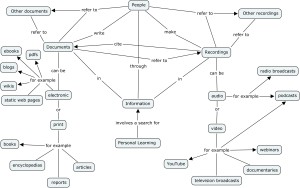Sometimes I follow The Learning Circuits blog and its monthly “Big Question”. This month’s questions were borrowed from the Work Literacy blog, which I’ve also been following lately. The questions that Tony Karrer asked on The Learning Circuits blog are leading questions:
Should workplace learning professionals be leading the charge around these new work literacies? Shouldn’t they be starting with themselves and helping to develop it throughout the organizations? And then shouldn’t the learning organization become a driver for the organization? And like in the world of libraries don’t we need to market ourselves in this capacity?
These aren’t the kind of questions one expects to generate serious debate. They are more like a rhetorical rallying cry to the already converted. “Yes! We should!” You can almost hear the answers, can’t you? Instead of answering, I find myself asking. What are these new literacies? Are they really new?
I’ve been following the work literacy blog trying to get an idea of what other people think are the required skills for professionals in today’s workplace. My main research interest has been the process of developing and cultivating a personal learning network/environment and I’ve been pleased to see the work literacy blog devote some time to PLN/PLE. However, the more I learn about PLN/PLE, the less “new” the skill seems.
When I was getting my master’s in public policy, I read a short little book by Eugene Bardach called A Practical Guide For Policy Analysis: The Eightfold Path To More Effective Problem Solving. Pages 50-53 include a section called “Locating Relevant Sources”. Without ever using the term, personal learning network, those pages contain the best description of the process of building a personal learning network that I have seen. Bardach suggests that “all likely sources of information, data, and ideas fall into two general classes: documents and people.” He then advises that
- documents lead to people,
- people lead to people,
- documents lead to documents,
- and people lead to documents.
In today’s world, the documents will likely be electronic, they may even be recordings in video or audio format, and the people may be on Twitter, but it is still the same process, just sped up.
I worked for a year as a Research Assistant at the Utah Office of Legislative Research and General Counsel. I was frequently asked to collect seemingly obscure data to help shed light on one policy issue or another. Through a combination of Google, email, and telephone calls, I usually found what I was looking for. I was good enough at my job that as I was leaving, my immediate supervisor suggested that I might return and offer a training workshop to the rest of the office. I shied away from the opportunity partially because I knew I’d be busy in my new responsibilities and partially because I thought my advice would be so simple as to be potentially insulting. I don’t think I had reflected enough on my research process to understand what I was doing beyond a tacit level. At that time, I don’t think I could have offered advice other than “Just Google It.” If given the same opportunity today, I think I would base my training on Bardach’s process.
This is a long way of saying that I don’t think that championing how to use Twitter or social networking or any of the new technologies really makes much of a difference. I believe that many individuals lack the understanding of the complex relationship between people, documents (or recording), and information. This is where the message needs to be. If people truly understood the networked nature of data, the networked technologies would almost sell themselves.


Kim, I like this framework you’re describing here and can easily see how we could show people that there are ways that social media can enhance their abilities to do each of these four tasks, more quickly, efficiently and effectively. Thanks for sharing this!
Pingback: Podcasting for Learning » links for 2008-08-10 [delicious.com]
Pingback: The Knowledge Blog » Blog Archive » How Knowledge Workers Use the Web
Pingback: The Knowledge Blog » Blog Archive » Leading Learning and New Skills